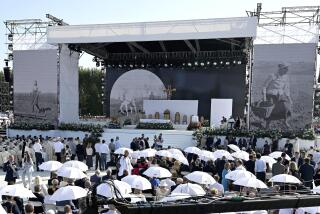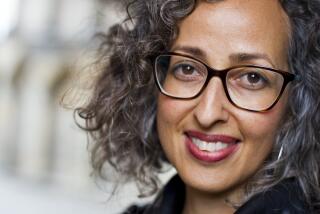Muslim Enclaves Hold Together in Poland : Religion: Descendants of barbarian Tartars cling desperately to their ethnic traditions in mostly Roman Catholic country.
- Share via
KRUSZYNIANY, Poland — It is possible to face Mecca even from this remote hamlet hard against the Soviet border.
Two Muslim families live on here, tending a tiny wooden mosque and a hillside cemetery where gravestones topped with crescent moons bear names like Kozakiewicz etched in Polish and Arabic.
The 3,000 Muslim Poles are a little-known enclave in a noticeably homogenous nation more than 93% Roman Catholic.
But Muslims have lived in Poland for six centuries and, they say, form the world’s oldest such community in lands never ruled by Muslims.
Most are direct descendants of the Tartars who galloped out of the Crimea, vanquished Russia and pillaged Poland.
The note “destroyed by the Tartars” describes monument after monument in Polish guidebooks, and Polish radio plays daily the broken-off call of a Krakow trumpeter sounding the alarm of a Tartar attack before being felled by an arrow to the throat.
Every schoolchild learns the date--April 9, 1241--when the Tartars’ first conquest of Poland reached as far west as Legnica, 130 miles from Berlin. The battle there left the most powerful Polish prince, Henryk the Pious, chopped into so many pieces it is said his mother could only identify him by the six toes on one foot.
This onslaught of the “Golden Horde” left a terror of barbarian invaders from the East that echoes through Polish political life to this day.
But when the Tartars did not battle the Poles, they fought alongside them--helping defend Poland against every invader from the Teutonic knights at Grunwald in 1410 to the Germans in 1939.
“I am Polish, of Muslim background,” emphasized Ali Popluwski, hobbled by a German bullet to his leg inflicted while the occupiers turned the Kruszyniany mosque into a World War II field hospital.
Popluwski is the mosque caretaker but there is no imam, or religious leader, anymore. One comes to lead prayers on the highest holidays from Bialystok, a city an hour away where the several hundred Muslims hold services in an apartment living room.
More frequent are the tourists’ visits, up to 1,000 a day on holidays. They are mainly the Middle East Arabs who, shunned elsewhere, were particularly welcome in Poland while its Communist regime snubbed the West.
Some set up tents in nearby cow pastures, but most come and go in glossy foreign cars, bumping down the single-lane dirt and cobbled lane after leaving their Polish brethren a little money on a silver tray.
It is enough to keep the mosque in prayer rugs, but not to fulfill the life wish of a 77-year-old Muslim trying to mind his religious heritage in a village of a couple dozen farmers without phones or indoor plumbing 144 miles east of Warsaw.
“Everybody dreams of going to Mecca but you need 2,000 green ones (U.S. dollars) to go to Mecca, not red money,” Popluwski said.
Still he proudly thumbs the register of visitors, many bringing messages from the Holy City. He has seen seven thick books filled.
“I hope someone will maintain the tradition when I go,” he said.
There are only two other mosques in Poland. One is equally remote, tiny and wooden, also dating to the 1670s, and located in the nearby border village of Bohoniki, where five or six Muslim families remain.
The other opened this spring in Gdansk, made possible by the donations of Arab students and funds raised by organizing trips to Turkey for Poles who go to trade, not tour.
The new mosque, the first in the country for nearly 200 years, is less a sign of a resurgent community than of the determination of the 120 or so Muslims who settled in the Baltic port city as postwar refugees from Soviet-annexed eastern Poland.
The Stalin-drawn border cut through a cluster of Muslim villages in what had been eastern Poland, leaving all but Kruszyniany and Bohoniki in the Soviet Union.
Many Muslims were deported with other Poles to Siberia, but others fled west into modern Poland. By 1947, they had held their first registration, counting 1,100 from a prewar population of about 5,500.
A Muslim historian who participated in the first postwar count in Gdansk won’t allow his name to be used. He’s tired, he says, of having his faith treated as an exotic curiosity in Poland. But he speaks proudly of his people’s accomplishments against the odds of religious and political repression.
Tartars, many prisoners of war, began to settle Polish lands during the 15th Century, becoming loyal subjects of their adopted kings. Largely through royal reward for military service, they began to accumulate wealth, land and the civic rights of the nobility, writes Warsaw University’s Jan Tyszkiewicz.
But poverty set in during the 16th Century when a law was passed barring non-Christian landowners from having Christian serfs.
Tartars had to sell off their lands. Many sought military careers, or entered professions or trade, living on as an identifiable community through Poland’s disappearance from the map at the end of the 18th Century.
Living under the Russians through the 19th Century, Muslims suffered with the rest of the Polish nation. In the graveyard at Kruszyniany, the headstones of Muslim Poles who died during the 1800s are written, as required by law, in Russian Cyrillic letters.
Many Muslim and Arabic texts, including the Koran, were translated into Polish and Lithuanian, but the ability to speak the Tartar tongue was largely lost.
“There are very big difficulties because the Muslims in Poland have been cut off from contacts with the Muslim world for 300 years,” the Gdansk historian said.
In Kruszyniany, the Golden Horde Cafe is closed, and Arabic writing on the bus ticket kiosk has been painted over. Popluwski’s granddaughter has moved with her mother to Bialystok where she can learn Muslim traditions.
But in Warsaw, where 150 to 200 Muslims live, a blueprint for a mosque has been drawn and construction is to start this year, funds permitting.
And in Gdansk, the historian is optimistic that centuries of Muslim tradition will continue in Poland.
“Unquestionably, I am convinced it will survive,” he said. “The traditions are very highly developed. This tradition once was connected with noblemen, and now it is more connected with ethnic pride.”
More to Read
Sign up for Essential California
The most important California stories and recommendations in your inbox every morning.
You may occasionally receive promotional content from the Los Angeles Times.













